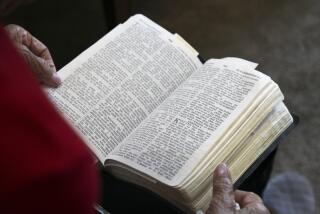A Lyrical, Lucid Rendering of a Timeless Tale
- Share via
An argument can be made that we live in the golden age of Bible translation, an era in which the origins and original meanings of the Bible are being made clear without sacrificing the literary impact of the ancient texts. A crucial piece of evidence in support of the argument is “The David Story,” a masterpiece of contemporary Bible translation and commentary by one of the world’s leading Bible scholars, Robert Alter.
Alter, who recently gave us a fresh translation of Genesis, now turns his attention to the life story of King David as we find it in 1 and 2 Samuel and in the opening passages of 1 Kings. His work is assured and authoritative, lyrical and lucid. For any reader whose experience of the Bible is limited to the stately but archaic English of the King James version--or one of its progeny--the experience of “The David Story” may seem like reading the Bible for the first time.
Thus, David’s elegy for the slain Saul and Jonathan is something grittier than what we find in the King James version. “How are the mighty fallen, and the weapons of war perished!” is rendered by Alter as “How have the warriors fallen, / and the gear of battle is lost.” Alter offers the rationale for his choice of words and phrases: The translators of the King James version understood “the weapons of war” as a metaphor for Saul and Jonathan (hence the use of “perished”), but Alter insists that “the lament concludes with a concrete image of shield and sword and bow abandoned.”
Alter, professor of Hebrew and comparative literature at UC Berkeley, is among the most respected and even revered practitioners of Bible scholarship. He is probably best known for “The Art of Biblical Narrative,” a groundbreaking study that encourages us to look beneath the theological surface of the biblical text to glimpse its beating heart. Indeed, he calls the story of David as we find it in the Bible “one of the most astounding pieces of narrative that has come down to us from the ancient world.”
David comes alive in all of his color and complexity in Alter’s vigorous translation. David is God’s anointed, “a man after His own heart,” but he is also described in the Bible as a “man of blood.” He is an adventurer and an adulterer, an exhibitionist and a voyeur, a man who conspires to murder the husband of Bathsheba after he impregnates her. His deathbed instructions to his son, Solomon, resemble “a will and testament worthy of a Mafia chieftain,” as Alter puts it, and yet David is also made to recite “high-minded, long-winded” platitudes in this speech by a biblical editor who wanted to put a pious spin on David’s ruthless last words.
Alter approaches the Bible with the full arsenal of contemporary Bible scholarship--a technical mastery of biblical Hebrew, a firm grasp of where the Bible fits in the sacred writings of the ancient world and human literature across the ages, and a profound expertise in what he calls excavative scholarship; that is, the attempt to identify the original authorship and the literary history of biblical texts. At the same time, Alter is a gifted translator, a poet with an ear for both ancient Hebrew and modern English.
All of these strengths are brought to bear on the task of retranslating the books of Samuel and the first few passages of 1 Kings, in which the life story of David comes to an end. Here, as in Alter’s translation of Genesis, the text is rendered in what he describes as “cadenced English prose that at least in some ways corresponds to the powerful cadences of the Hebrew.” The translation is explained and elaborated upon by Alter in the detailed commentary that appears as a series of footnotes keyed to the text. Indeed, “The Story of David” can be approached as two books in one, the biblical text and the parallel commentary that runs across the bottom of each page.
Alter does not squarely answer the question of whether David and his exploits are myth or history, but he clearly leans toward the “historicity” of David. “What we have in this great story,” he concludes, “is not merely a report of history but an imagining of history that is analogous to what Shakespeare did with historical events and figures in his history plays.” Alter’s comparison of the nameless biblical author to Shakespeare--and Stendhal, Balzac, Tolstoy and Proust--suggests what Alter regards as the highest and best use of the Bible.
Jonathan Kirsch, a contributing writer to the Los Angeles Times Book Review, is the author of, most recently, “Moses: A Life.” He is working on “The King of the Jews: A Life of David” (Ballantine).

